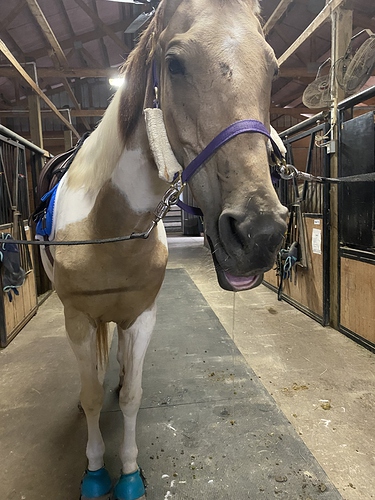Oh my, I’ve missed a lot while at work today!
I want to address a few things:
-honey wasn’t in lessons because she was gaining weight/muscle and we were working through some of her anxieties, starting at the very beginning of training (trying to find holes in training) and basically restart her. many people were upset on coth for riding her or having others ride her just a few months ago. So she didn’t do much riding. I did take lessons, but on things like : ground driving, being more clear when lunging, etc. things that were more relevant to what I was doing at the time.
-horses, dogs…heck even men! Not everyone is meant for everyone. I get that, and I think we all do. I appreciate the people trying to cheer me on, but I also appreciate the people saying that if this isn’t a fit, that’s okay and I don’t need to feel guilty.
Which brings me to…
-“rearing”. I think things got misconstrued because it’s more of a pop up and the ASB fans wanted me to know that it is a common evasion technique in the breed. I think this came about more as a response to potentially selling her, and that a rearing horse would be hard to sell/immoral for me to sell. I never took it like “yeehaw, it’s fine!” I just thought, okay, she’s sensitive and her build is different than what I previously had ridden, and other people have experienced this. Then it went into stories and silliness, but never did I think someone in here was telling me to suck it up.
-honey is not grade. But I don’t know what her life was like before 3 years old. At 3 she lived in a field, was underfed, and would occasionally go on trail. At about 8 or so she went to a “trainer” who does do some dressage. Honey had a baby about 3 years ago, and otherwise has gone on the random trail or gone into dressage training, where she was held into a frame. So she has some training, but there’s gaps and anxieties surrounding things, and my trainer is trying to go slow to identify where all those holes and anxieties lie. That all said, even if she never did saddle seat, knowing what she was bred for is helpful information.
-honey in the crossties (summer. I haven’t gotten pics lately in crossties) :



 . It also doesn’t really matter if she DOES decide to keep Honey and put her time and energy and money into learning to work with her. That’s her choice, as long as Honey is being taken care of (which it looks like she is!). BTDT and honestly, I personally wouldn’t do it again - it worked out fine but now that I’ve had more suitable horses I wish I’d moved that one on sooner and found something like my current guys that I can depend on to be fun and easy to deal with.
. It also doesn’t really matter if she DOES decide to keep Honey and put her time and energy and money into learning to work with her. That’s her choice, as long as Honey is being taken care of (which it looks like she is!). BTDT and honestly, I personally wouldn’t do it again - it worked out fine but now that I’ve had more suitable horses I wish I’d moved that one on sooner and found something like my current guys that I can depend on to be fun and easy to deal with.